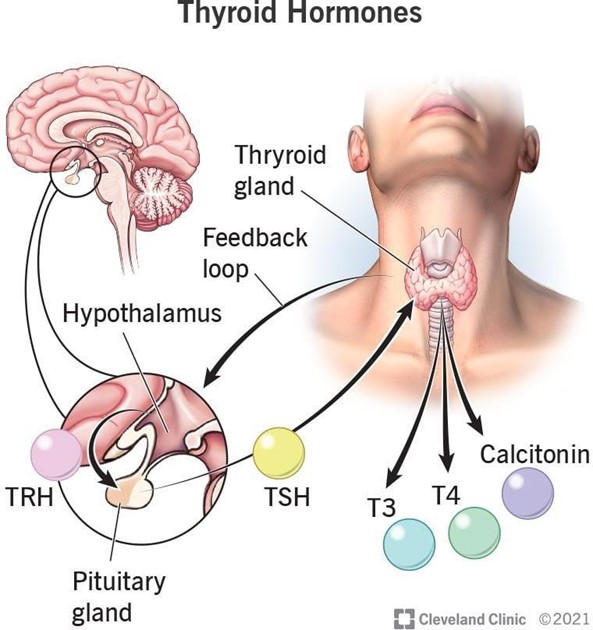A nurse is caring for a client who has a prescription for levothyroxine.
Which of the following laboratory tests should the nurse monitor?
Serum potassium
Triiodothyronine
Blood urea nitrogen
Prothrombin time
The Correct Answer is B
Explanation B.Triiodothyronine
Levothyroxine is a synthetic form of the thyroid hormone thyroxine (T4). It is converted to triiodothyronine (T3), the active form of the thyroid hormone, in the body. Monitoring the levels of triiodothyronine (T3) can help assess the effectiveness of levothyroxine therapy and ensure that the client's thyroid hormone levels are within the desired therapeutic range.
Serum potassium levels in (option A) should not be monitored because they are not directly affected by levothyroxine. However, imbalances in electrolytes can occur in some individuals with thyroid disorders. Electrolyte levels may be monitored, but it is not the primary focus of monitoring for levothyroxine therapy.
Blood urea nitrogen (BUN) in (option C) should not be monitored because it is a test used to assess kidney function and is not directly related to monitoring levothyroxine therapy.
Prothrombin time (PT) in (option D) should not be monitored because it is a test used to evaluate the clotting function of the blood and is not specifically related to monitoring levothyroxine therapy.

Nursing Test Bank
Naxlex Comprehensive Predictor Exams
Related Questions
Correct Answer is D
Explanation
Budesonide is a corticosteroid inhaler used for long-term management of asthma. It helps to reduce inflammation and prevent asthma symptoms. Rinsing the mouth and gargling with water after using a corticosteroid inhaler can help reduce the risk of developing oral thrush, a fungal infection.
The other statements are incorrect and indicate a misunderstanding of the teaching: "I will take my inhaler treatment before each meal and at bedtime": Budesonide is not typically used before meals or at bedtime. It is usually taken on a regular schedule, as prescribed by the healthcare provider, to provide long-term control of asthma symptoms.
Using the inhaler before exercising is important because physical activity can trigger asthma symptoms in some individuals. By using the inhaler before exercise, the client can help prevent exercise-induced asthma symptoms. However, this depends on the degree of difficulty of the exercise.
"I should use my inhaler when I have an asthma attack": Budesonide is not a rescue inhaler for immediate relief of asthma symptoms during an asthma attack. It is a controller medication meant to be used regularly to prevent symptoms from occurring.
Correct Answer is B
Explanation
By using short, simple sentences, the nurse can effectively communicate with the client who is exhibiting signs of agitation and anxiety. This communication style can help reduce stress and confusion for the client and promote understanding.
Asking the client if they would like to watch television: While providing options for activities can be beneficial, it is important to address the client's current state of agitation and anxiety before suggesting any specific activities.
Allowing the client to have 1 hour of time alone in their room: While some clients may prefer solitude, in this case, the client's pacing and hand-wringing indicate signs of distress and may require therapeutic interventions rather than isolation.
Moving the client to a table where other clients are playing cards: This option may not address the client's current state of anxiety and pacing. Placing the client in a social setting with other clients might increase their distress and agitation.
Whether you are a student looking to ace your exams or a practicing nurse seeking to enhance your expertise , our nursing education contents will empower you with the confidence and competence to make a difference in the lives of patients and become a respected leader in the healthcare field.
Visit Naxlex, invest in your future and unlock endless possibilities with our unparalleled nursing education contents today
Report Wrong Answer on the Current Question
Do you disagree with the answer? If yes, what is your expected answer? Explain.
Kindly be descriptive with the issue you are facing.
